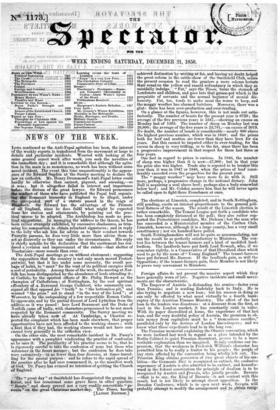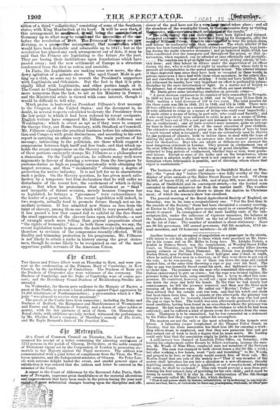Foreign affairs do not present the massive aspect which they
have generally worn of late. Negative incidents and small move- ments are the characteristic.
The Emperor of Austria is disbanding his armies—faster even than Prussia ; and is sending Radetzky back to Italy. He is also trying to negotiate a new loan ; but his success in doing so can only be effected by what must virtually be a fourth bank- ruptcy of the Austrian Finance Ministry. The effect of the last loan to the lenders was disastrous : at a discount from the first, at least in the London market, it has constantly sunk in value. With its paper discredited at home, the experience of that last loan, and the very doubtful policy of Austria, the premium to ob- tain money from capitalists must be a "tremendous sacrifice," paralleled only by the devices of London linendrapers ; and we i what those expedients lead to in the long run.
The Prussian-memorial explaining the Olintitz convention, which we were inclined last week to regard as a gloss intended by the Berlin Cabinet to quiet Prussian discontent, proves to be. a more veritable explanation than we imagined. It only confirms our im- pression, that the weakness in Frederick William's charaeter has permitted him to be really a traitor to his people ; the people of any state affected by the convention being wholly left out. The Prussian King obtains possession of two great objects of his am- bition—the Germanic Diet is recognized as extinct, the exclusive supremacy of Austria is also admitted to be extinct, and hencefor- ward in the federal constitution the principle of dualism is to be recognized by Austria and rrussia, who jointly preside. Bavaria —that is to say, the King of Bavaria—is not content with this result, but is not likely to attempt direct opposition. In the Dresden Conference, which is to open next week, Bavaria will probably attempt to modify the arrangement and to _obtain moot.
nition of a third " coll 'vity," consisting of some of the Southern states, with Fine MATimilian at its head. It will be seen tha4,if this arrangement...be -isailinned; bring the adeitibutionitei Germany up to wliat mabe considenul the necessites of the cone before the revolutien of 8. Tie- Prineesof Germany. arc new devising, as a proarectlie" arrangement, flirt constituftion whibfi would have been desirable and admissible up to 1847; but as the revolution has placed any such arrangement out of date, it may be said that the Princes are legislating in the future for the past. They are basing their institutions upon foundations which have passed away; and the new settlement of Etmope is a atzuotane condemned from the first as rotten and unstable.
In. Paris,. the Legitimists- are making some new move, the sha- dowy agitation of a galante-show. The aged Count Mole is get- ting up a dub, as some say to recruit the President's supporters with Legitimists and Orleaniste. But the fact is that it is prin- cipally filled with Legitimists,. and other parties laugh at it. The Count do Chambord has also appointed-a new committee, mueh more numerous than the last, to act as his Ministry in France ; and the Ministerial crisis is viewed with some interest, though it would be difficult to tell why. Much praise is bestowed on President Fillmore's first message to the Congress of the 'United Stokes: and the document is, no doubt, in several respects calculated to elevate the Presidency from the low- point to which. it had been reduced by recent oocupants. English. writers have compared Mr. Fillmore with Sefferson and Washington; which is about as apt as if they were to compare Si George Grey, our Home Secretary, with Strafford. or Cromwell. Mr. Fillmore explains the practical business 'before his administra- tin and Congress with. great distinctness, and aceording to his own report is carrying on, affairs- very ably. The main- portions of his message, interesting to the politician, are those whieh suggest a compromise between high tariff and. free trade, and that which up- holds the recent compromise on: the Slavery question. But neither of these portions eminently stamps Mr. Fillmore as a philosopher or a statesman. On the Tariff question, he collects many well-worn arguments in favour of drawing a revenue from the foreigners by oustoms-duties as high as possible consistently with obtaining the largest revenue, and thus " incidentally " obtaining a degree of protection for native industry. It is not left for us to charaoterize an& a policy. On the Slavery question, he has given much satis- faction by a temperate but firm declaration that he will suffer no disturbance of the recent law, the excitement of which is (lying away., But when he pronounces that settlement as " final " and incapable of future revision, merely because Congress has so legislated, he betrays a "greenness" very extraordinary in the leader of a great nation. The recent legislation will indeed, in two respects, actually tend. to promote future though not an im- mediate revision. It has admitted new States as free from the taint of slavery, among them one which will be very powerful; and it has passed a law that cannot fail to exhibit in the free States the cruel oppression of the slavery-laws upon intlividualsr—a sort of example much more telling than general propositions about "the rights of humanity," &c. : in both these respects, we say, the recent legislation tends to promote the Anti-Slavery influences; and therefore to revision, of the compromise recently effected. With finality and trimming protection m his programme, Mr. Fillmore is net likely to attain a niche in history among the great states- men) though he seems likely to be recognized as one of the most opportune public servants of the American Union.



























